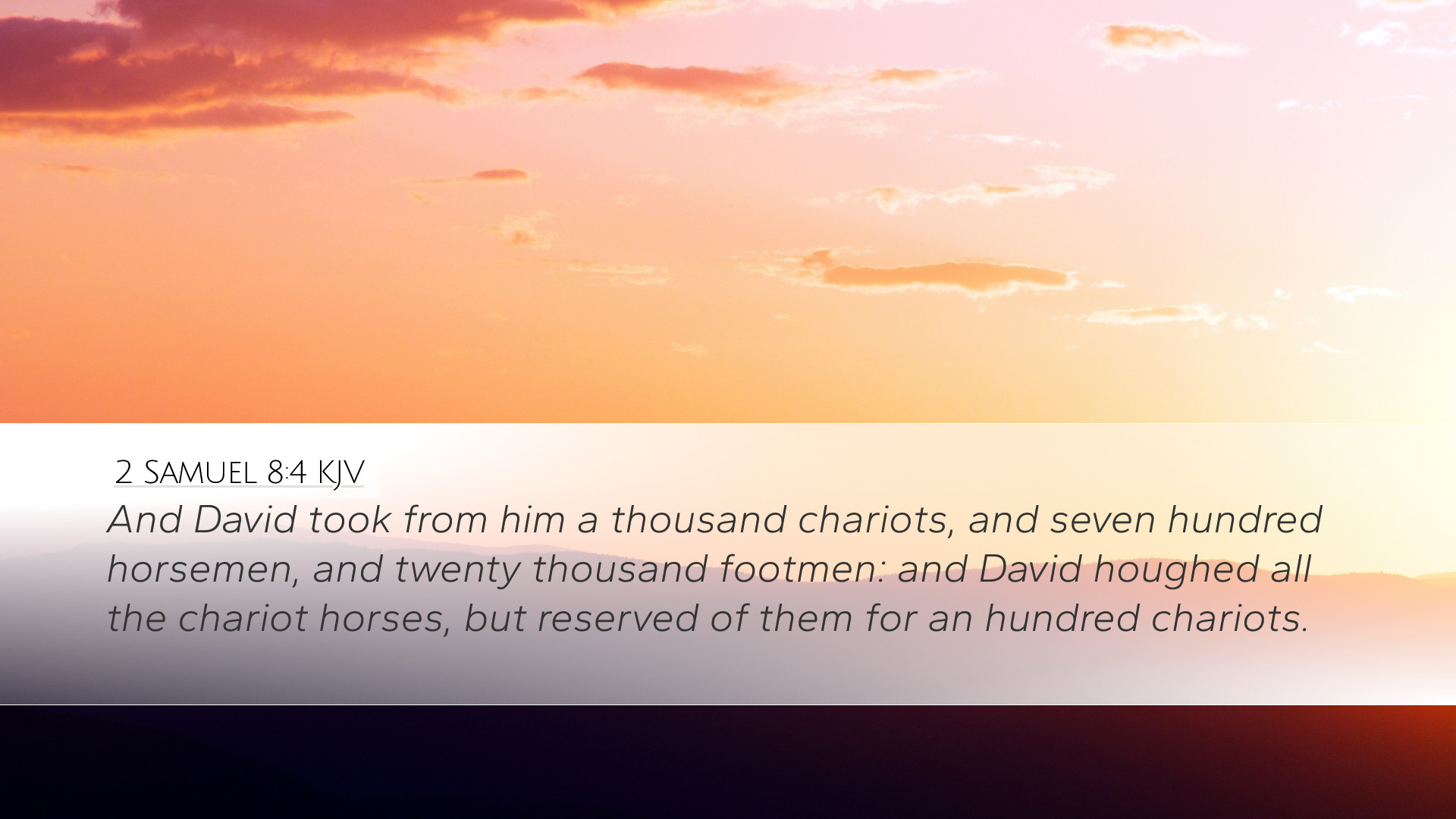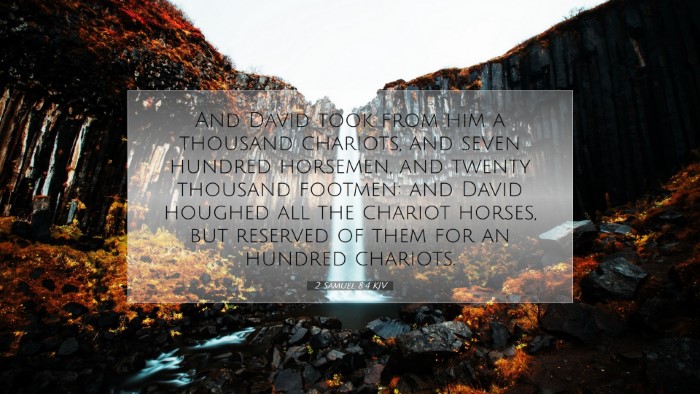Old Testament
Genesis Exodus Leviticus Numbers Deuteronomy Joshua Judges Ruth 1 Samuel 2 Samuel 1 Kings 2 Kings 1 Chronicles 2 Chronicles Ezra Nehemiah Esther Job Psalms Proverbs Ecclesiastes Song of Solomon Isaiah Jeremiah Lamentations Ezekiel Daniel Hosea Joel Amos Obadiah Jonah Micah Nahum Habakkuk Zephaniah Haggai Zechariah Malachi2 Samuel 8:4
2 Samuel 8:4 KJV
And David took from him a thousand chariots, and seven hundred horsemen, and twenty thousand footmen: and David houghed all the chariot horses, but reserved of them for an hundred chariots.
2 Samuel 8:4 Bible Commentary
Commentary on 2 Samuel 8:4
Verse Text: "And David took from him a thousand chariots, and seven hundred horsemen, and twenty thousand footmen: and David houghed all the chariot horses, but reserved of them for an hundred chariots." (2 Samuel 8:4, KJV)
Overview of the Context
This verse is situated in the narrative of King David’s expansion of his kingdom and military power. Following his establishment as king over Israel, David engages in a series of battles to subdue enemies and solidify his reign. This particular passage highlights both the spoils of war that David acquires and his strategic military decisions.
Insights from Public Domain Commentaries
Matthew Henry's Commentary
Henry emphasizes the significance of David's military conquests and God's providence in granting him victories. He notes that the taking of chariots, horsemen, and footmen signifies a military enhancement for David's forces. The act of “houghed” suggests a deliberate limiting of military capacity, as it would prevent the chariots from being used offensively in subsequent battles. This speaks volumes about David’s military strategy, which was aimed at reliance on God rather than on vast resources.
Spiritual Implications
According to Henry, there are spiritual lessons in David’s actions. The reduction of his resources demonstrates a dependence on divine strength rather than human power. This is an important principle for leaders today: while resources can be a blessing, the foremost reliance should always be on God’s guidance and support.
Albert Barnes' Notes
Barnes elaborates on the military tactics of David, noting that the number of chariots and troops signifies both military power and the potential for expansion. He explains that houging the horses was a common practice to limit the adversary's mobility and effectiveness, which aligns with the broader narrative of securing David’s extensive territorial gains.
Cultural and Historical Context
This commentary considers the cultural context of warfare during David's time. Horse-drawn chariots represented technological superiority on the battlefield. By taking the horses but restricting their use, David demonstrated a keen understanding of warfare that allows Israel to operate from a position of strength without over-reliance on technology.
Adam Clarke's Commentary
Clarke presents detailed analysis regarding the specific numbers presented in the scripture. He notes that the figures convey not only the outcome of a single battle but the continued success of David’s campaigns. The emphasis on “seven hundred horsemen” alongside “twenty thousand footmen” indicates a well-rounded military strategy that values both cavalry and infantry forces.
God’s Governance in Warfare
Clarke emphasizes that while David acquired great military might, it was ultimately God's governance and favor that led to his victories. He suggests that the mention of the spoils serves to recognize God’s hand in David's life and reign.
Theological Reflections
As pastors and theologians reflect on 2 Samuel 8:4, several key theological concepts emerge:
- The Sovereignty of God: The successes of David clarify God's omnipotent governance in the events of history. David’s military success is a testament to God’s overarching sovereignty.
- Trust in Divine Provision: The act of restricting chariot use symbolizes a deeper theological truth: true victory comes not from numbers or weapons but from reliance on God.
- The Weight of Leadership: David’s choices reflect the burden of leadership, necessitating wisdom and discernment in the decisions that affect the nation.
Conclusion
In conclusion, 2 Samuel 8:4 offers profound insights for contemporary Christian leaders and scholars. This verse encapsulates themes of military strategy, spiritual reliance, and God’s sovereignty throughout history. By exploring the implications of David's actions and God's role in his reign, we are reminded of the foundational truth that God equips and sustains those He calls to lead.


